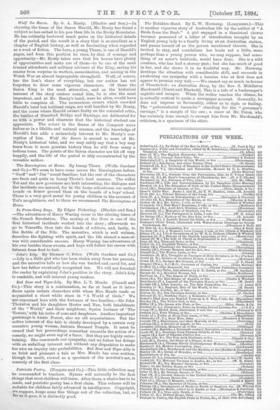WuV the Saxon. By G. I. Henty. (Blackie and Son.)—In
choosing the times of the Saxon Harold, Mr. Henty has found a subject no leas suited to his pen than life in the Rocky Mountains. He has evidently bestowed much pains on the historical details of the period, and the result is a story that is as excellent as a chapter of English history, as well as fascinating when regarded as a work of fiction. The hero, a young Thane, is one of Harold's pages, and from this position he rises, by dint of courage and opportunity—Mr. Henty takes care that his heroes have plenty of opportunities and make use of them—to be one of the most trusted attendants and military advisers of the King, saving his master from surprise in warfare, assassination, and seizing in the Welsh War an almost impregnable stronghold. Wulf, of course, has the lion's share of everything, but our author has not forgotten to draw some vigorous characters. Of these the Saxon King is the most attractive, and as the historical interest of the story centres round him, he is also the most important, and at Mr. Henty's hand, were he alive, would have little to complain of. The momentous events which crowded Harold's brief but brilliant reign, are well handled by Mr. Henty, and the scene where Harold swears fealty on the concealed relics, the battles of Stamford Bridge and Hastings, are delineated for us with a power and clearness that the historical student can appreciate. The actors in the drama of the Conquest move before us in a lifelike and natural manner, and the knowledge of Harold's fate adds a melancholy interest to Mr. Henty's con- ception of him. Wulf the Saxon is second to none of Mr. Henty's historical tales, and we may safely say that a boy may learn from it more genuine history than he will from many a tedious tome. The points of the Saxon character are hit off very happily, and the life of the period is ably reconstructed by the 'versatile author.






































 Previous page
Previous page